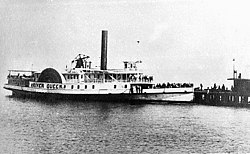 The Conference took place on the River Queen, near Union-controlled Fort Monroe in Hampton, Virginia. | |
| Negotiators |
Secretary of State William H. Seward Vice President Alexander H. Stephens Assistant Secretary of War John A. Campbell Senator Robert M. T. Hunter |
|---|---|
The Hampton Roads Conference was a peace conference held between the United States and representatives of the unrecognized breakaway Confederate States on February 3, 1865, aboard the steamboat River Queen in Hampton Roads, Virginia, to discuss terms to end the American Civil War. President Abraham Lincoln and Secretary of State William H. Seward, representing the Union, met with three commissioners from the Confederacy: Vice President Alexander H. Stephens, Senator Robert M. T. Hunter, and Assistant Secretary of War John A. Campbell.
The representatives discussed a possible alliance against France, the possible terms of surrender, the question of whether slavery might persist after the war, and the question of whether the South would be compensated for property lost through emancipation. Lincoln and Seward reportedly offered some possibilities for compromise on the issue of slavery. The only concrete agreement reached was regarding prisoner-of-war exchanges.
The Confederate commissioners immediately returned to Richmond at the conclusion of the conference. Confederate President Jefferson Davis announced that the North would not compromise. Lincoln drafted an amnesty agreement based on terms discussed at the Conference, but met with opposition from his Cabinet. John Campbell continued to advocate for a peace agreement and met again with Lincoln after the fall of Richmond on April 2.